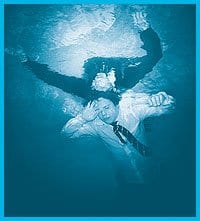Heavy hitters abound in the excellent Monte Clark show My So-Called Life, reflecting not only the gallery’s reputation but the vision of young curator Daniel Faria. As the TV-inspired title suggests, the show is about youth and visibility. Faria is well aware that eroticism is associated with youth, and that budding sexuality can be a conduit to homoeroticism. But youth also brings in its wake complexities like anxiety, limitations and mortality. Because Faria is capable of appreciating the density of adolescence the show is rarely obvious or overstated.
Artists Justine Kurland, Larry Clark, Derek Root, Douglas Coupland, Danny Lyon and Anthony Goicolea all use youth as subjects, and each of their pieces explore the appealing and the uncomfortable. These artists use adolescence as a vehicle to explore the constraints of innocence when met with a viewer’s gaze.
Kurland’s photograph entitled Boy Torture, A Midsummer’s Night, where girls huddle in tight-knit packs in a forest, reflects the dilemma of innocence as a virtue. The lush greenery, saturated colour and large scale of Kurland’s piece is as exotic as it is disturbing because when your eye reaches the left corner of the photograph we see a lifeless boy surrounded by girls. Are they helping him and acting as nurturers or are they responsible for the boy’s demise? The title suggests the latter and with that, the piece annuls any intrinsic nature of gender.
The work in this exhibition isn’t afraid to both push convention and challenge us as viewers.
The show is primarily photography but there is also some painting and video. The paintings by Derek Root are well executed and explore the innocence of youth activities such as singing in a choir. The large-scale The Clearing is intended as a backdrop to a performance, and is heavily layered in meaning. The subjects are in the background, leaving only brushstrokes as details of expression. We cannot really see what the boys or the teachers look like, which results in an eclipsed understanding of what’s going on. In an open field under the stars and moonlight, the boys are in sailor uniforms and the teachers in black gowns. What is this picture saying? Is it possible that the children are simply rehearsing in an amphi-theatre? Is it a sexualized portrayal or is it an opening sequence to a horror film?
The work in My So-Called Life creates a tension to understand the meaning of the pictures, even if they have multiple meanings.
Certainly one of the most controversial figures working with youth culture is Larry Clark (creator of the film Kids). His photographs in this show are without doubt the least shocking images by Clark that I have seen. That said, I appreciate the chance to look at his images in a different way; it felt like I could look a long time and savour the details. The black and white pictures of a young, masculine teenager are expectedly alluring with the man/child chillin’ on the roof of a car in his Daisy Dukes. But the crisp contrast and grain of the photograph creates a wholesomeness that Clark seldom indulges.
The piece that truly floored me was Anthony Goicolea’s NailBiter, a short video screened in the basement of the gallery. To view it, you must walk through the office area, then down the stairs, which might deter some visitors. But please do not let this prevent you from seeing NailBiter. You will regret it.
Inside a cabin the night vision video camera is pulled far back from a young boy sitting in bed. Lights swish across him as his eyes dart in fear. To the sounds of owls and crickets we see the boy with his fingers in his mouth. As the camera zooms in we hear a click click sound and as the camera lands on the young boy’s face we see drool oozing and tips of fingernails encased in his mouth. The camera pans to expose heaps of nails covering his sweatered chest, and cascading down onto his wool blankets. The images’ green hue and disjointed pace creates a very unsettling horror film effect. As the light flicks and splashes across his face, we are confronted with such a profound anxiety that we hear what can be assumed to be the nail-biter’s heartbeat. This piece reminds me of a Mike Kelly piece where Kelly’s mouth is stretched to its limit with sausages. Both of these pieces explore issues of control, cruelty and oral fixation.
My So-Called Life is an ominous show where all the pieces are on the cusp of something – good or bad is unknown. The show inspires the metaphor of jumping off a cliff and being freeze-framed in that moment. It’s spontaneous, free-floating but ultimately unknowable. Will we plunge into the cool waters, or smash our heads on the rocks below?
This show proposes the similar question: What happens next? As a viewer, I like to think this feeling is temporary, that another image will circumvent discomfort. In revealing adolescence as a rehearsal for adulthood, the show offers no resolution. We are somewhat unknowable. This is a superb, enlightening show.
* My So-Called Life continues at the Monte Clark Gallery (55 Mill St) until Sun, May 1; call (416) 703-1700.

 Why you can trust Xtra
Why you can trust Xtra


